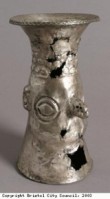By David Brough
LONDON, Jan 4 (Reuters) – A jewellery retailer has imported the world’s first “Fairtrade” and “Fairmined” silver to Britain, in a bid to improve livelihoods of miners working in dangerous conditions and ensure ethical standards and traceability.”Fairtrade” silver pays a premium price to poor, independent miners, who represent the vast majority of the labour force mining precious metals globally.CRED Jewellery, based in Chichester in southern England, has imported some 3 kg. of the silver, extracted from the remote Sotrami mine in Peru, one of the mines certified as Fairtrade and Fairmined.CRED Jewellery paid a 10 percent Fairtrade premium for the silver, which is invested in socio-economic projects in the mining community.CRED’s first Fairtrade silver jewellery, likely to include necklaces featuring ingots, is expected to cost the final consumer some 5 percent more than equivalent silver jewellery that does not bear Fairtrade and Fairmined certification.Silver prices have trebled since the height of the global financial crisis in late 2008 but subsistence miners have not cashed in.
CRED Jewellery director Alan Frampton said miners often had no alternative but to dig for a scant living and were denied their rightful profits by local entrepreneurs.
“There is a huge amount of corruption in the precious metals world and people are being kept in poverty by corrupt traders,” he told Reuters.
More Fairtrade and Fairmined jewellery, which is accredited by the Fairtrade organisation, is expected to be delivered to licensees in the UK in coming months.
Established in 1992 the Fairtrade Foundation is an independent non-profit organisation that licenses use of the FAIRTRADE Mark on products in accordance with internationally agreed Fairtrade standards.
Leading British jewellers launched certified “Fairtrade” gold in 2011, part of a growing market in ethical goods ranging from tea to travel.
The Fairtrade Foundation and the Alliance for Responsible Mining has said that Fairtrade gold is forecast to account for 5 percent of the global market in the next 15 years as the initiative is rolled out internationally.
Buyers wanted to know that miners received a fair price and that the environment was not harmed in the production process. (Reporting by David Brough; editing by Keiron Henderson)
